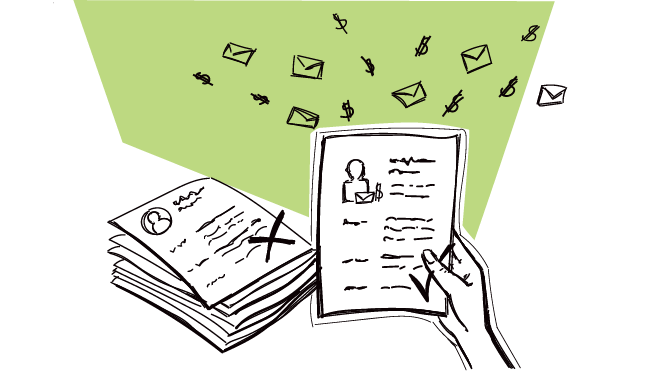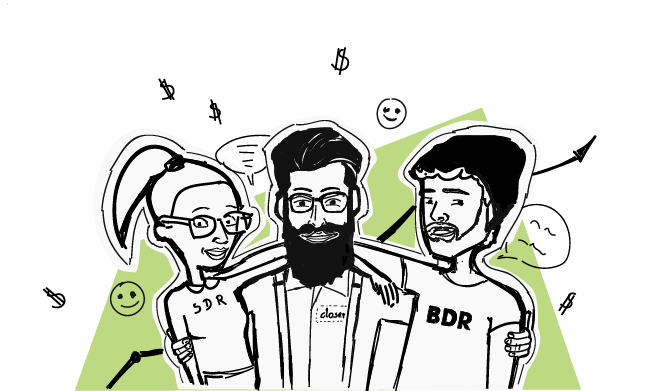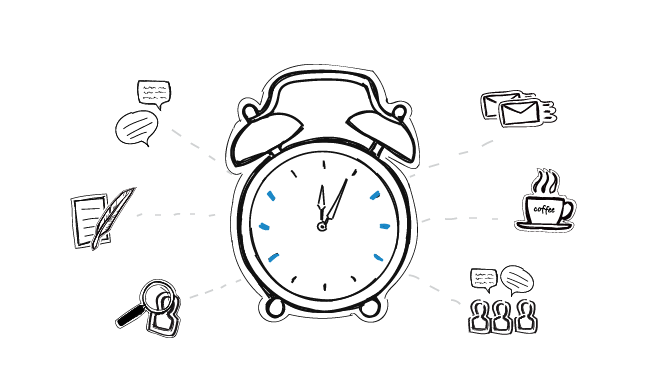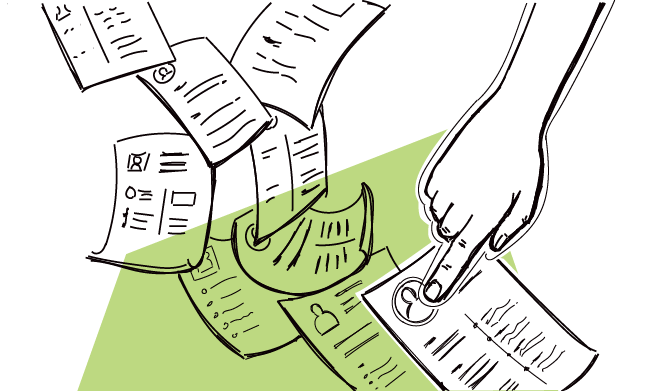A while ago I wrote a blog post about hiring an SDR to handle cold mailing at your company. Today we’ll take a look at another important role in the sales team: a Business Development Representative – and how to hire one.
How does this position differ from a Sales Development Representative? Where to find the right candidates? How to determine whether they’ll be good at their job? Use the tips I offer in this blog post and you’ll find the right BDR for your sales team in no time.
What does a Business Development Representative do?
The list of a BDR’s responsibilities might vary – it really depends on the company. In one it might be the person whose focus is on outbound outreach, while in another – the one who takes over leads from an SDR, qualifies them and moves them through the funnel up to the point when they make the final decision whether to buy your product/subscribe to your service or not.
For the sake of this blog post let’s agree it’s the latter.
Now, let me show you how to hire a BDR.
Step #1 Decide who it is exactly that you’re looking for
If you read my blog post about how to hire an SDR, you might be familiar with ‘candidate personas’. This idea will come in handy when you’re hiring a BDR as well.
Before you even start searching, you need to determine who you’re REALLY looking for.
To help you with finding the right candidate for your sales team, I’ve come up with some qualities a BDR has to have. A Business Development Representative should:
- be able to evenly distribute their attention on leads in various stages of the sales process. Some of them are just at the beginning, others are almost at the point of making a decision, and others are somewhere in the middle. If one of the stages is neglected, in the end the continuity of the whole process will suffer
- be able to assess whether a lead is a good fit for your company or not. Sometimes it may seem that a lead has a great potential to convert, but later it turns out that they don’t really have the need to buy your product or service – and it was just the enjoyable conversation that made a salesperson think otherwise. A BDR has to be able to tell these two apart, basing this decision on hard data, not a feeling
- have excellent knowledge of your industry and ICP – they can acquire it after getting the job, but if they know your business niche, that’s already a huge plus. This probably means they already speak your leads’ language and know their pain points
- be able to set goals for themselves and stick to them + reflect on their performance and adjust it if needed
- learn who the prospective client is over and over again. They should ask questions such as ‘Why do they buy the product?’, ‘Why do they need it?’, ‘Where do they see the value?’
- know how to handle rejection and not take it personally. They need to remember that it’s the offer that got turned down, not them. That’s why it’s best if they’re glass-half-full kind of people.
But similarly as with Sales Development Representatives, you might divide the job into two positions.
If your company has grown big enough, you might split the roles into an Opener and a Closer.
Although they manage almost the same part of the sales funnel, the two positions can be quite different. Also, not many people have character qualities of both of these groups.
Let’s see how those roles differ in terms of character traits and skills.
An Opener:
- is a good ice breaker. They’re the type that becomes good buddies with a lead after exchanging a couple messages
- knows how to juggle many leads simultaneously
- is diligent – and systematically puts all the data into a CRM
A Closer:
- has to be a good listener and read between the lines to identify what the lead is really saying – and how to get rid of their objections (if they have any)
- has to know how to be friendly, yet strict at the same time. If the Closer’s too friendly, they might find it difficult to ask to set a deadline for the lead’s decision. A Closer needs to strike that balance where they’re still friendly, but can also be very matter-of-fact and situate themselves on an equal position to the lead – not higher or lower
- knows how to steer the conversation so it reaches its end goal. Leads may have objections, and if the salesperson doesn’t approach them in the right way, the dialogue might last forever. One of a Closer’s most important skills is gently pushing the lead to make a decision
If you’re looking to hire only one person, think about what talent you already have onboard and who’s going to bring the most value to your sales team. Consider what character traits and qualifications your salespeople have – and seek such a candidate that’ll complement them.
Step #2 Start the search process
How to find the right candidate?
When you’re hiring a Business Development Representative it’s best to go one of these two routes (or both of them):
- Networking: this way is head and shoulders above all the other ones. After all, what better way to find a suitable sales talent for your team than getting a referral from a colleague?
- By industry: knowing your niche will give a candidate a huge advantage over others. Why? They’ll be able to decide more easily which leads are right for your business and more likely to convert into customers. They’ll know their struggles and what language they use.
‘What about putting a job posting online?’, you may ask.
Well, it surely is a possibility, but I wouldn’t bet the farm on it when looking for a BDR. Why? Your sales team is too important a point in your company to look for a candidate this way.
One thing I would recommend, though, is this: keep an ongoing recruitment process for this position. It’s best if there’s a bunch of candidates that you may consider interviewing at all times. If you’re open to hiring remote talent, especially for SDR roles, the Philippines is a great market known for strong English skills and sales experience. Remote People makes it easy to find and hire qualified SDRs from the Philippines without the hassle of setting up local offices.
And one thing I wouldn’t recommend, is hiring someone who is very competitive and tries to point all the attention to himself, you know – someone who’ll charm leads at first but won’t be able to strike the right chord with them as they don’t quite know what your company’s ICP is.
Step #3 Create the list of interview questions
What questions can you ask your candidates?
- Why are you interested in working as a Business Development Representative?
- How would you assess if a lead is a good fit for our company?
- What value do you see in our product/service?
- How would you describe our product/service to a lead?
- How do you build connection with leads?
- How do you deal with rejection?
- Can you think of any objections a lead may have to buying our product/service? How would you handle them?
- What does your ideal work environment look like?
- Why would you make a great Business Development Representative?
Apart from their sales skills and knowledge, there’s a couple of other important things you can evaluate during the interview. Are they confident around people they’ve just met? What’s the tone of their voice like? Do they seem convincing in their answers?
It’s also important for the candidate to fit into your company culture (that’s why you should ask question #8) and to actually be a fan of your product (and that’s why you should ask question #3). After all, if they don’t believe in it, how will they be able to sell it?
You may also add a more unusual question to see if they’re able to think fast – a skill that is useful in a fast-paced sales world.
Tips for hiring the best BDRs
These tips and reminders can streamline the BDR hiring process, supporting better outcomes for sales roles and new business opportunities in the future.
- Clarify job descriptions. Be specific about the BDR role and the sales goals they will target to attract qualified leads.
- Look beyond prior experience. Seek potential candidates who exhibit drive and the ability to learn, even if they are new hires.
- Attend networking events. Connect with global talent and spot top talent who align with your sales team’s needs.
- Assess both hard and soft skills. The ideal candidate needs to balance resilience and adaptability with expertise in cold calling and qualifying leads.
- Evaluate cultural fit. Ensure that the new BDR aligns with your company’s culture to promote long-term growth and teamwork.
- Stay involved in the long haul. Remember that hiring decisions impact your sales development reps for the long term. Look for candidates who show potential for staying the course.
- Focus on development. When onboarding, highlight business development training and mentorship to cultivate well-rounded business development representatives.
Key points to remember
- Business development reps play a critical role in creating business opportunities.
- Strong communication skills and problem solving abilities are vital for new hires.
- A BDR team helps qualify inbound leads and connect with potential customers.
- Hiring managers should prioritize finding top talent with a mix of hard and soft skills.
- Consider prior BDR or SDR experience when selecting bdr candidates.
- Lead generation involves hard work and cold calls for successful sales goals.
Your turn to share
A Business Development Representative is a crucial part of your sales team. Use the tips I gave you above and you’ll see that finding the very best candidates isn’t as hard as you might’ve thought.
Let me know in the comments how your hiring process goes.
FAQ on hiring a BDR
How to hire a BDR?
To hire BDRs effectively, start by identifying your ideal candidate with the necessary hard and soft skills for the BDR role. Look at prior experience in lead generation and evaluating their communication skills to ensure they align with your sales team.
Why hire a BDR?
Hiring BDRs supports your sales team in generating leads, qualifying them, and moving them through the sales cycle. Business development representatives are key to opening new business opportunities and ensuring a seamless process toward closing deals.
Is BDR a stressful job?
The BDR role can be stressful due to handling cold calls, working under tight deadlines, and meeting ambitious sales goals. Business development reps face challenges like rejection and maintaining motivation, making resilience and problem solving essential qualities for the best BDRs.
What qualities should a BDR have?
A BDR candidate needs strong communication skills, the ability to qualify inbound leads, and a proactive approach to cold calling. They should handle the pressure, show soft skills like adaptability, and have hard work ingrained in their approach to attract qualified leads.
Where can hiring managers find potential BDRs?
Hiring managers can find potential candidates at networking events, within industry-specific candidate pools, or through recommendations from global talent networks. Searching by job descriptions related to sales development representative SDR can help pinpoint the right talent.
READ ALSO

How to Hire an SDR to Handle Cold Emailing at Your Company?
When you’re about to hire an outbound specialist but know zip about cold mailing yourself, you might find yourself stabbing in the dark. Should you hire one specialist or split the job into two positions? Where do you look for candidates? What questions should you ask them to assess if they’ll do a good job prospecting and reaching out to prospective clients? I believe this blog post will help you maneuver through the hiring process and find a good Sales Development Representative to handle cold mailing at your company.

How to Build an Effective Outbound Sales Team?
If you’re considering building an internal outbound sales team, it’s a sign that your company levels up. But how do you know this is actually the right moment to hire? And what roles do you need in your team for a start? What’s the difference between SDR and BDR? How to figure it all out? This blog post answers all these questions and sheds some light on how to build a team that is effective and motivated to succeed.

A day in the Life of a SaaS Business Development Team
A business development team is a crucial element of a SaaS company. It plays an important role in business growth and revenue generation. Let’s take a look at the backstage of their job. I’ve prepared this post in collaboration with Yurii Veremchuk, the Head of Woodpecker Business Development Team, who shared some first-hand insights into the day-to-day work of his team and the challenges they face, described the tools that improve their efficiency, and gave his advice for B2B sales newbies.

